The Electronic Intifada 5 August 2021
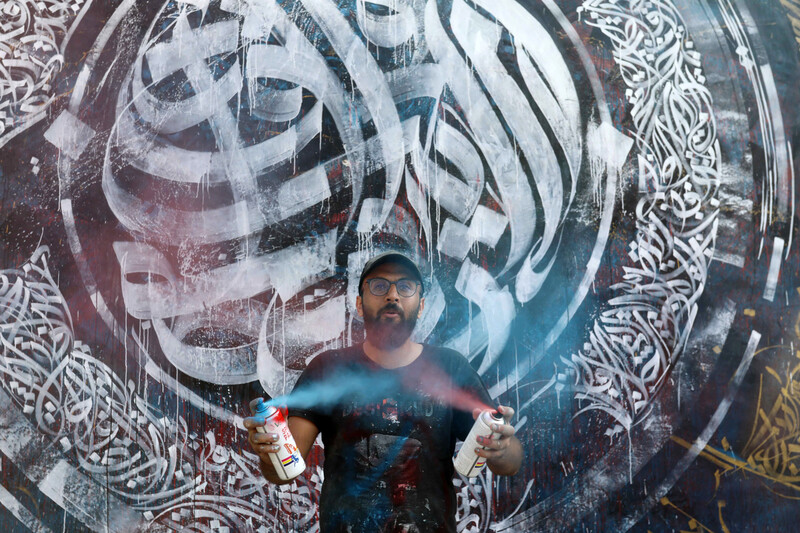
Palestinian artist Bilal Khaled paints a wall in Gaza City on 1 July.
APA imagesIsraeli forces killed five Palestinians in the occupied West Bank during July and a sixth died from injuries sustained in May.
Muhammad Farid Hassan, 21, was killed in Qusra, a village near the northern West Bank city of Nablus, on 3 July after Israeli settlers accompanied by soldiers raided the community.
Israel claimed that soldiers shot at Hassan after he threw an explosive device. Palestinians said that settlers beat Hassan after he was shot.
In Nabi Saleh, a West Bank village near Ramallah, Israeli soldiers in a military vehicle shot 17-year-old Muhammad Tamimi in the back with live ammunition on 23 July. The soldiers provided no assistance to Tamimi, who attempted to move into a nearby home but collapsed on the stairs and died from his wounds later that night.
Israel claimed that the slain teen “threw stones in a manner that fatally threatened one of the soldiers” in an apparent attempt to retroactively justify the wanton killing of a child.
Three days later, Yousif Nawaf Muharib, also 17, died after being wounded in the neck by Israeli gunfire during protests near Ramallah on 14 May. Israeli forces and settlers killed or fatally injured at least 12 Palestinians in the West Bank that day, including Muharib.
Another child, 11-year-old Muhammad Abu Sara, was shot in the chest and killed while sitting in his family’s car as they ran errands in the Hebron-area village of Beit Ummar in the southern West Bank on 28 July.
The following day, Israeli soldiers killed Shawkat Khalid Awad, 20, as occupation forces attacked Muhammad Abu Sara’s funeral procession, shooting Awad in the head and abdomen and injuring at least 12 others.
On 27 July, Israeli soldiers shot and killed Shadi Salim, 41, in Beita, a village near Nablus in the northern West Bank. Salim was reportedly ambushed by soldiers while returning home from his work as the village’s water engineer.
Fifty Palestinians have been killed by Israeli forces in the West Bank so far this year. The Israeli military killed around 250 Palestinians in Gaza during the same period.
Gaza under siege
More than 8,200 Palestinians in Gaza remain internally displaced after Israel’s attacks during May. Those who remain displaced are staying with host families or in rental accommodation, according to the UN monitoring group OCHA.
Palestinian authorities in Gaza determined that 1,255 homes were destroyed and 918 sustained severe damage, rendering them uninhabitable, and 50,000 homes sustained minor damage during the May escalation.
Additionally, more than 330 schools and kindergartens and 33 health facilities were damaged.
Electricity supply remains lower than before the May escalation. Power is currently available for an average of 14 hours per day across Gaza versus 16 hours per day before the escalation.
Gaza remains under a comprehensive air, land and sea blockade imposed by Israel since 2007. According to OCHA, only one in every three patients who apply for an Israeli permit to leave Gaza for medical treatment has obtained approval by the time of their scheduled appointment.
Israel carried out airstrikes in Gaza during July, reportedly targeting military sites, after incendiary balloons were launched from the territory and caused fires in Israel.
Israel also further reduced the permitted fishing area off of Gaza’s coast in an act of collective punishment prohibited under international law.
Israeli naval forces chased and opened fire towards a 50-year-old fisher and his 18-year-old son while they were sailing off of Gaza’s northern coast on 29 July. Both were arrested and taken to an unknown location, according to Al Mezan, a human rights group in Gaza.
A Palestinian man was killed and 14 others were injured in an explosion in a building at a Gaza City marketplace on 22 July.
“The three-story structure collapsed and several nearby houses and shops sustained damage,” OCHA said.
“Some sources suggested that the blast resulted from explosives which were being stored in the building.”
Mass demolition
In the West Bank, Israeli forces carried out a mass demolition in the Palestinian herding community of Khirbet Humsa in the West Bank’s Jordan Valley on 7 July. Thirty structures were demolished, displacing six families, including 24 children.
Israeli forces dismantled and confiscated a tent in the same community on 15 July. The tent had been installed to accommodate a family of eight, among them six children, who lost their previous home earlier in the month.
Israeli forces confiscated some 50 structures in the herding community of Ras al-Tin near the city of Ramallah on 14 July.
“Thirteen households, comprising 84 people, including 53 children, were displaced and are at heightened risk of forcible transfer,” OCHA stated.
Israeli settlers under police escort moved into an empty building in the Wadi Hilweh area of the Silwan neighborhood of East Jerusalem on 2 July. “This is the second settlement compound established inside Palestinian communities in East Jerusalem, both in Silwan, since the beginning of the year,” OCHA said.
On 4 July, Israeli authorities summoned a 9-year-old Palestinian boy for interrogation in the Old City of Jerusalem.
“Since mid-April, at least 65 Palestinian children have been arrested by the Israeli authorities in East Jerusalem. Over half of these children were arrested in June alone,” OCHA stated.
Among the some 300 Palestinians arrested by Israel in the West Bank during July were 45 university students detained in Turmus Ayya village near Ramallah during a protest against punitive home demolitions.
They were protesting Israel’s revenge demolition of a home belonging to the estranged wife of a Palestinian detained over the killing of an Israeli student in the West Bank.
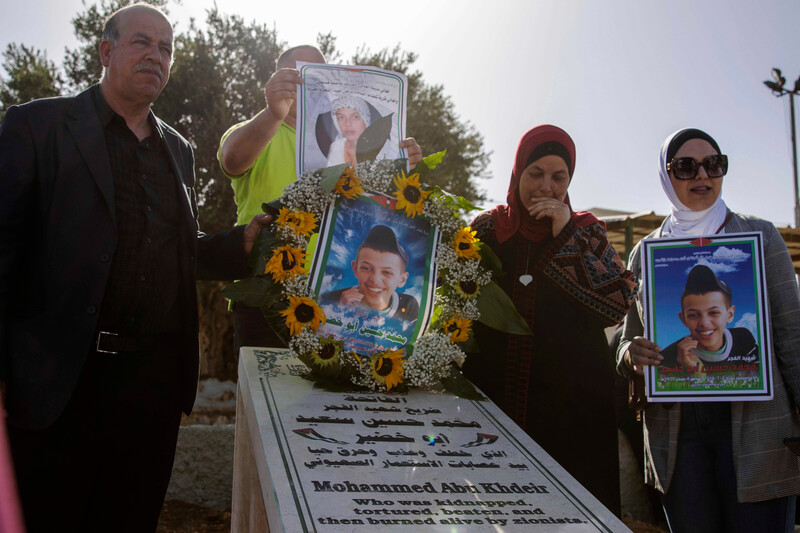
The family of Mohammed Abu Khdeir stands at the boy’s grave in the Shuafat neighborhood of Jerusalem on 3 July. Abu Khdeir’s family held a remembrance ceremony to mark seven years since the 16-year-old’s kidnapping and brutal killing at the hands of Israeli settlers.
ActiveStills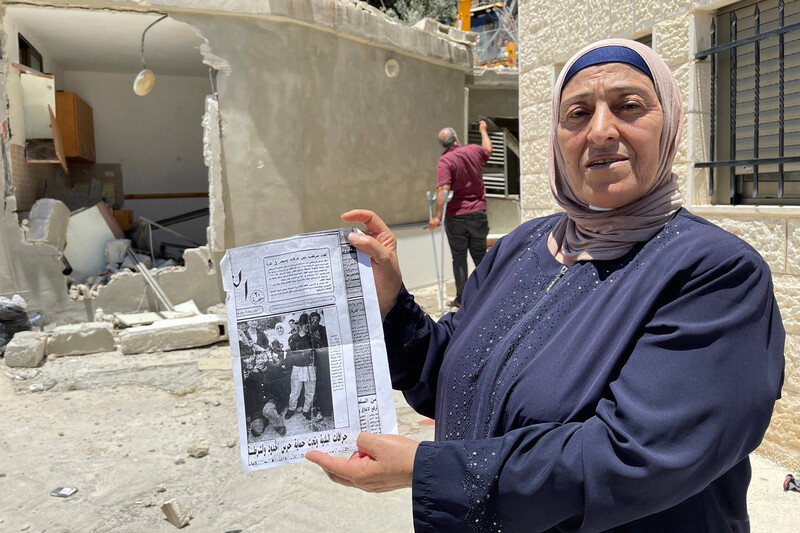
A member of the Abu Ghannam family stands next to the rubble of her home after it was demolished in the East Jerusalem neighborhood of al-Tur on 6 July. The family demolished the home to avoid paying exorbitant costs if the Jerusalem municipality carried out the demolition orders. This is the second time Abu Ghannam’s home has been demolished; the first time was in 1994.
APA images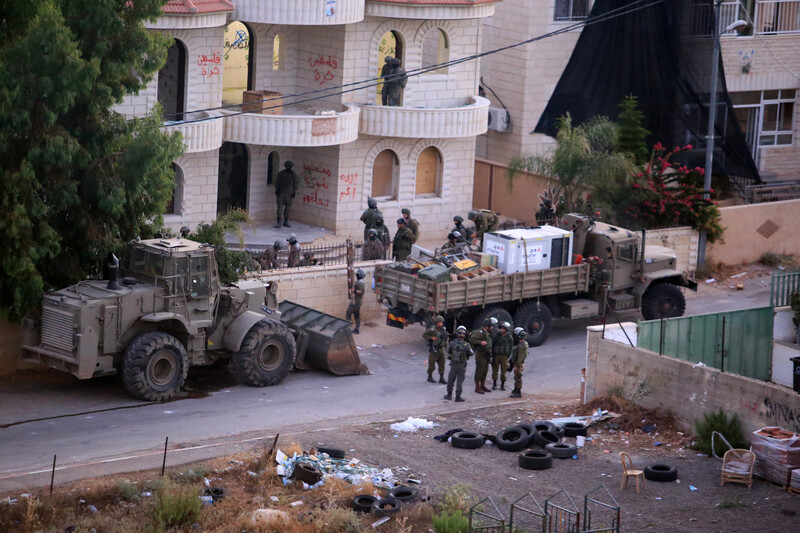
Israeli soldiers stand outside the home belonging to the estranged wife of Muntasir al-Shalabi and their children in Turmus Aya, near the West Bank city of Ramallah, on 8 July. The Israeli military demolished the home in punitive revenge over the alleged involvement of al-Shalabi, who is in Israeli detention, in a West Bank shooting attack that killed an Israeli student.
APA images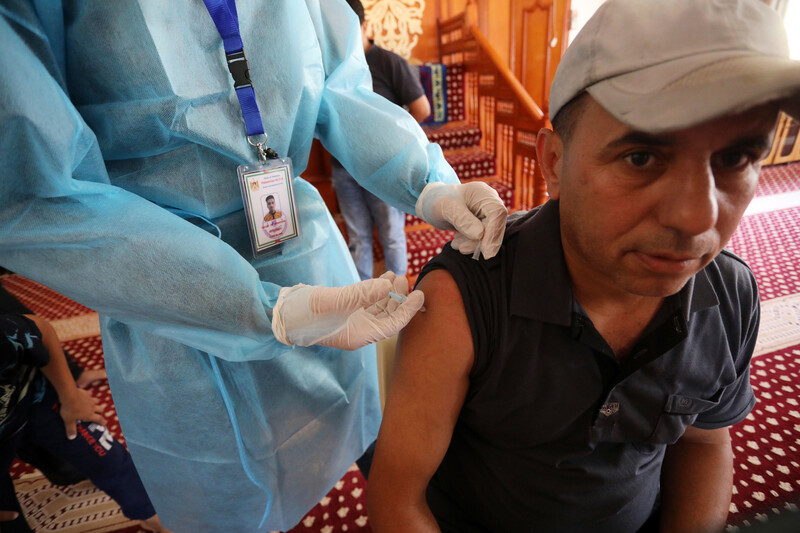
A Palestinian man receives a dose of Russia’s Sputnik V COVID-19 vaccine at a mosque in Khan Yunis, southern Gaza Strip, on 8 July.
APA images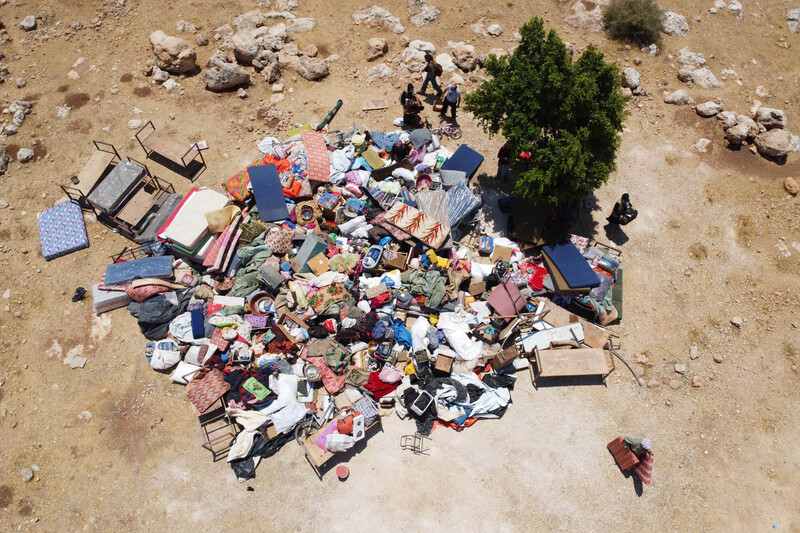
Residents of the Khirbet Humsa community in the West Bank’s Jordan Valley collect their belongings confiscated by Israeli forces and dumped at Ein Shibli, 8 July. The day before, Israel demolished the entire village for the seventh time since November 2020 in its ongoing attempt to displace this community.
ActiveStills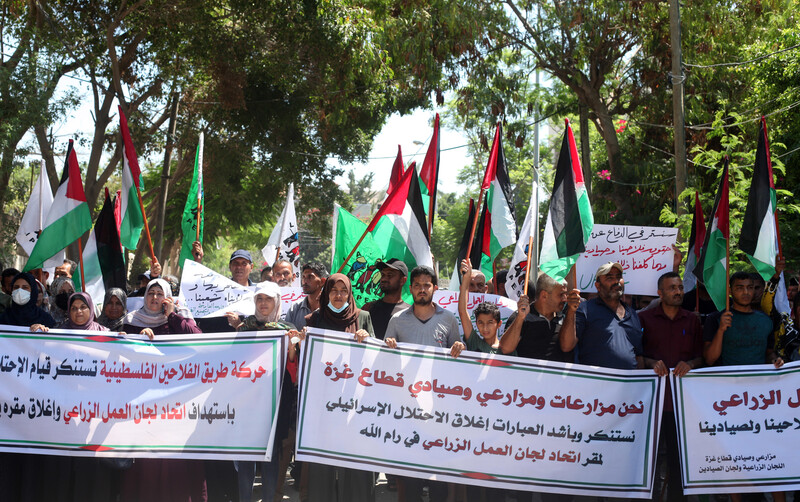
Palestinians take part in a protest against Israel’s closure of the Union of Agricultural Work Committees’ Ramallah headquarters in front of UNSCO’s offices in Gaza City on 8 July. The Palestinian Authority condemned Israel’s “systematic and widespread attacks” on the Palestinian health and agriculture sectors, “including the continued and deliberate targeting, ongoing raids and shut down of the Health Worker Committees and Union of Agricultural Work Committees and harassment of their staff.”
APA images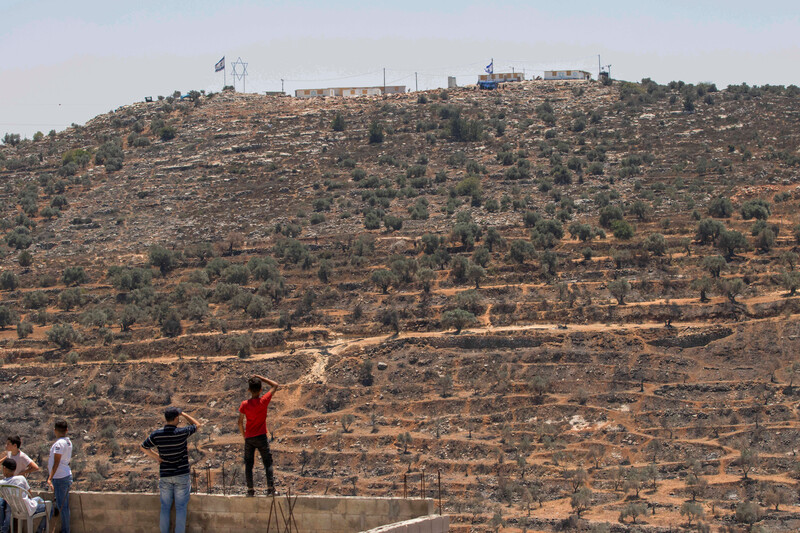
The new settlement outpost of Evyatar is seen on a hill overlooking Beita on 9 July. Hundreds of protesters attended the weekly demonstration against the outpost and against Israel’s colonial expansionist policies resulting in the takeover and dispossession of Palestinian land.
ActiveStills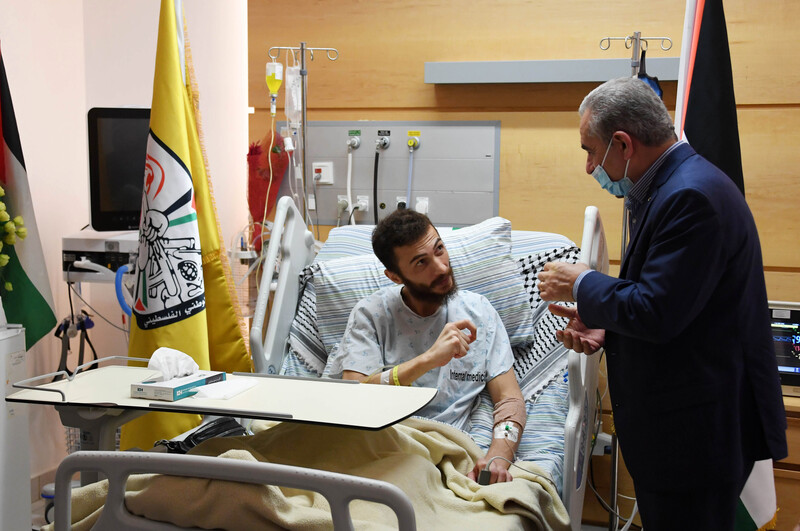
Palestinian Authority Prime Minister Mohammed Ishtayeh visits Ghazanfar Abu Atwan, newly released from Israeli detention, at a hospital near the city of Ramallah in the West Bank on 9 July. Abu Atwan went on hunger strike for more than 60 days in protest of being held without charge or trial after being arrested in October 2020.
Prime Minister’s office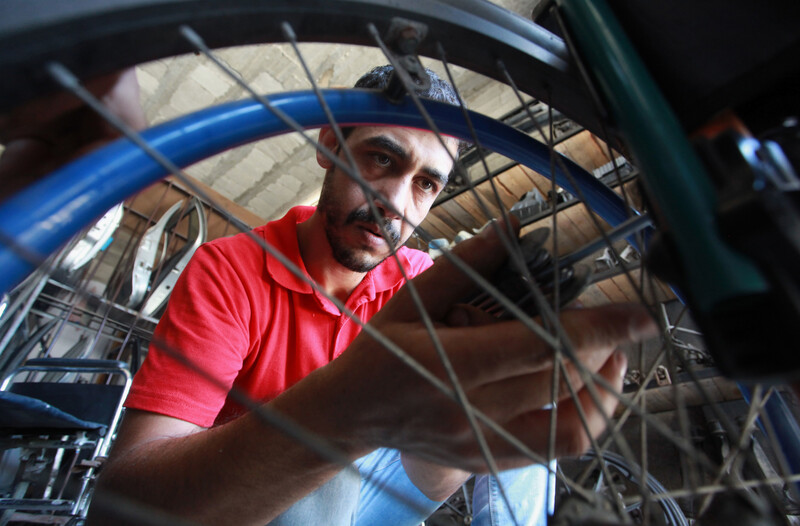
A Palestinian repairs a wheelchair at a Gaza City workshop on 10 July as part of a youth initiative to repair mobility devices for people with disabilities free of charge.
APA images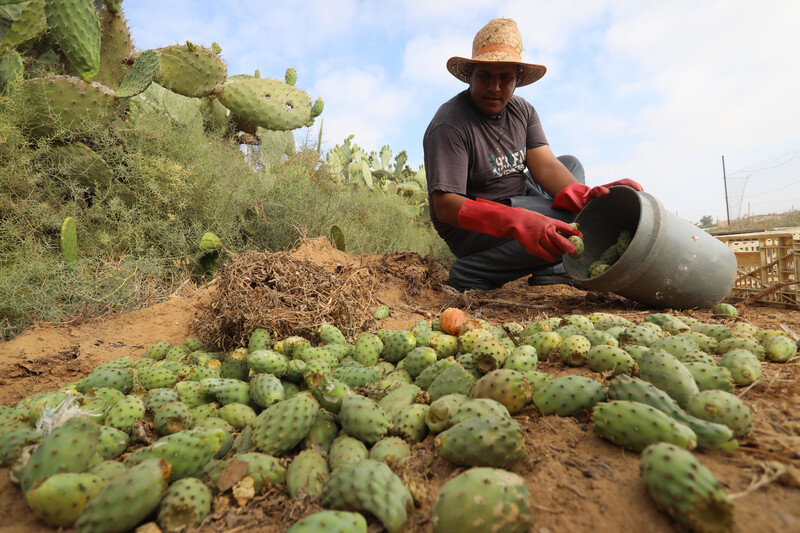
Palestinians pick prickly pear fruit in Khan Younis, southern Gaza, on 12 July.
APA images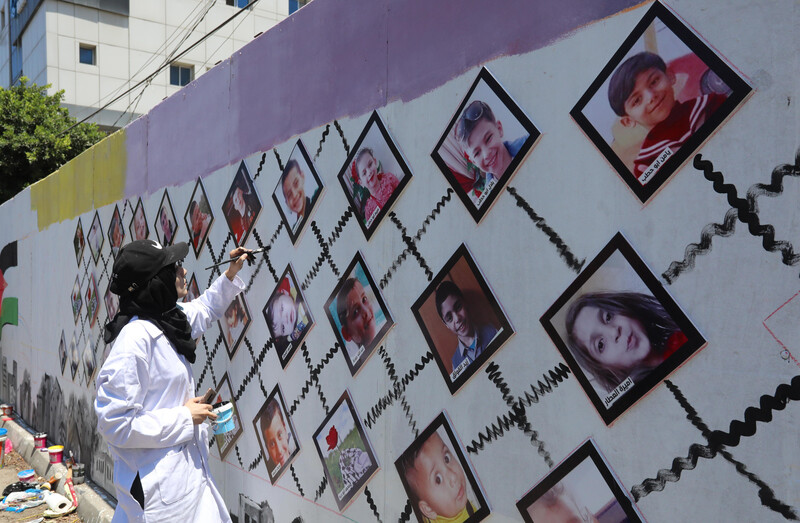
Palestinian artists paint murals and display photos of children who were killed during the recent Israeli military escalation in front of the United Nations Development Program offices in Gaza City on 13 July.
APA images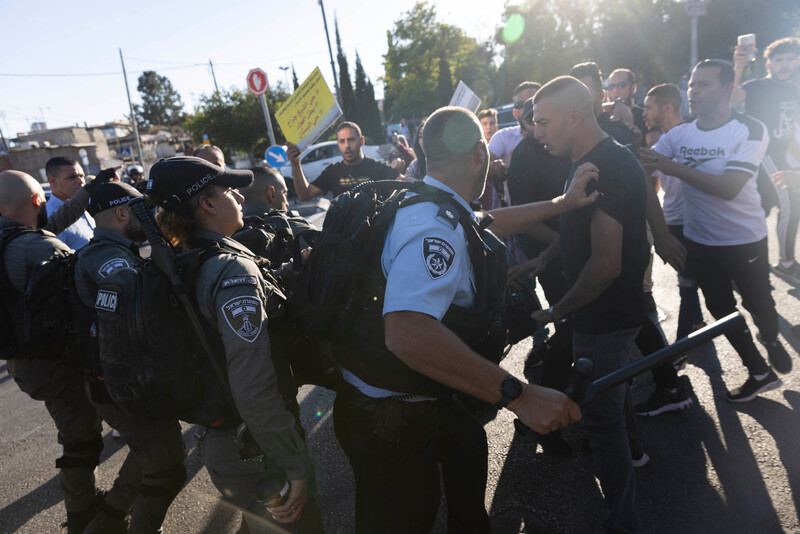
Israeli police violently disperse Palestinians protesting in support of Sheikh Jarrah residents under threat of eviction in favor of Israeli settlers in the East Jerusalem neighborhood, 17 July.
ActiveStills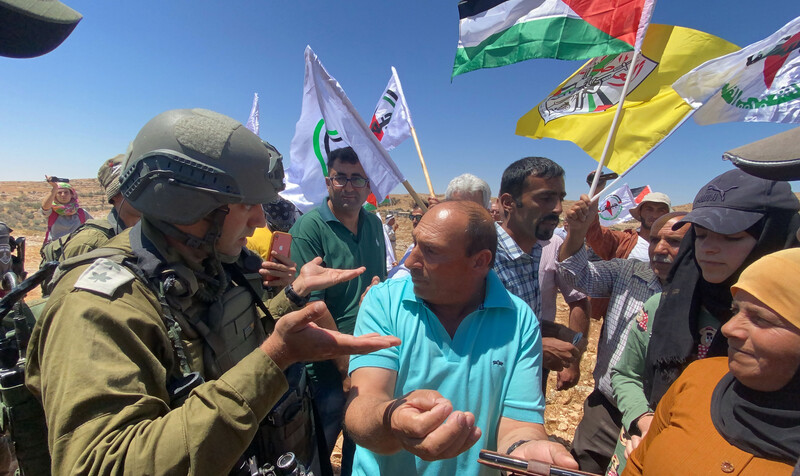
Palestinians argue with Israeli soldiers during a protest against the confiscation of land near the village of Yatta, south of the West Bank city of Hebron, on 17 July. Israel denies planning permits for Palestinians to build on their land or to extend existing houses to accommodate natural growth, particularly in Jerusalem and Area C, which constitutes 60 percent of the occupied West Bank.
APA images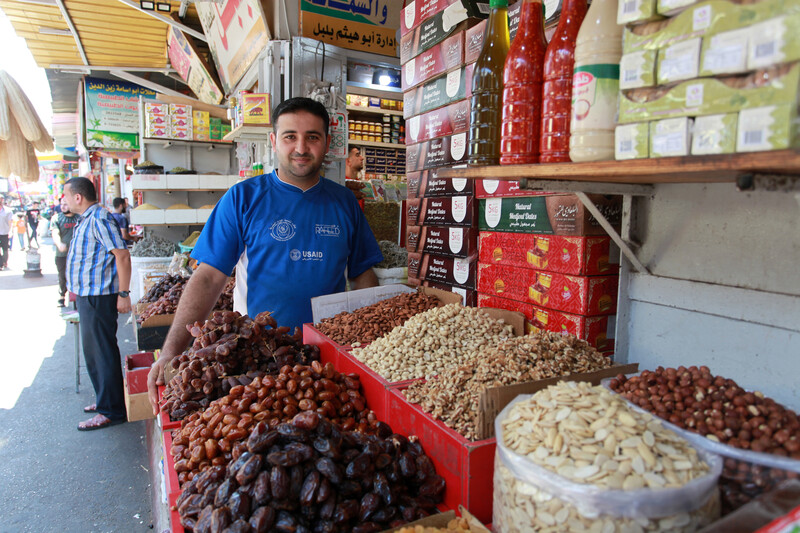
Palestinians shop at Gaza City’s al-Zawiya market ahead of Eid al-Adha on 15 July.
APA images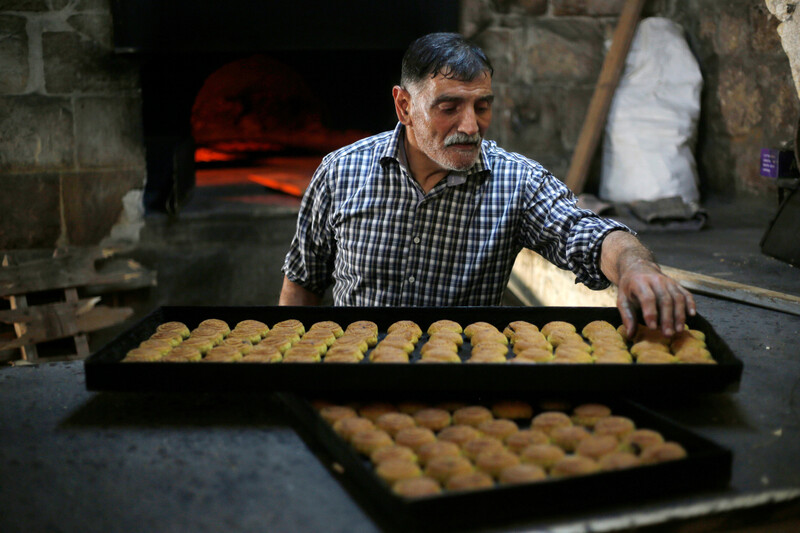
A Palestinian vendor prepares traditional date-filled mini cakes ahead of Eid al-Adha at a market in the West Bank city of Nablus on 18 July.
APA images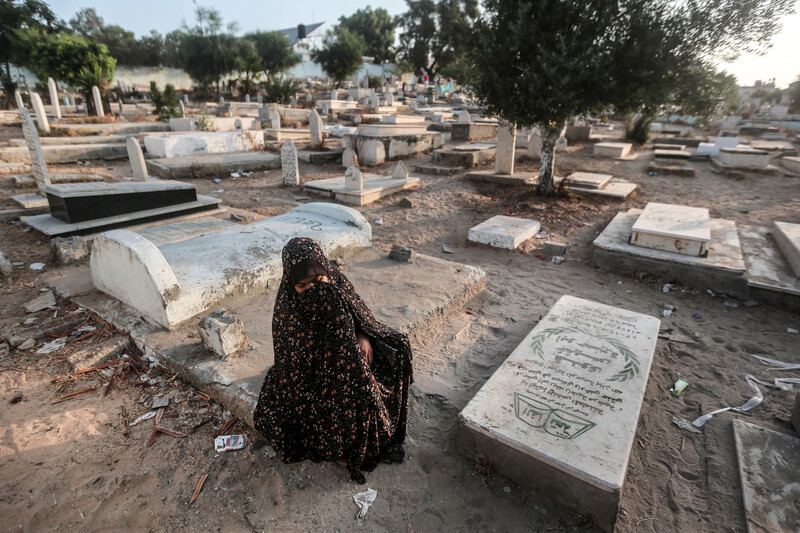
Palestinians visit the graves of their relatives at a Gaza City cemetery on the first day of Eid al-Adha, 20 July. Eid al-Adha, or Feast of the Sacrifice, marks the willingness of the Prophet Abraham to sacrifice his son and celebrates the end of the annual hajj pilgrimage to the holy city of Mecca.
APA images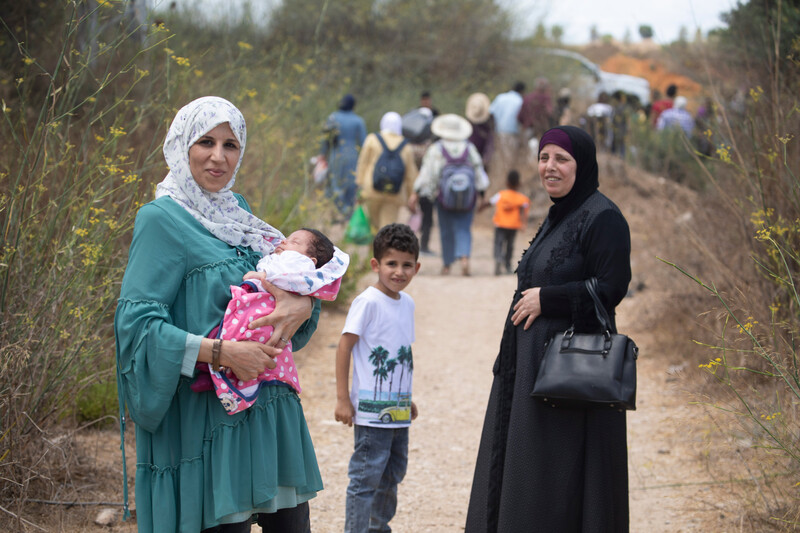
Palestinians cross the Israeli barrier near the West Bank city of Tulkarem during the third day of Eid al-Adha on their way to celebrate at the beach and other places beyond the Green Line, 22 July. During the holiday, many Palestinians from the West Bank sneak through the Israeli barrier in the territory to reach Jaffa. Some people 40 years of age or older are able to obtain permits from the Israeli military to travel beyond the Green Line.
ActiveStills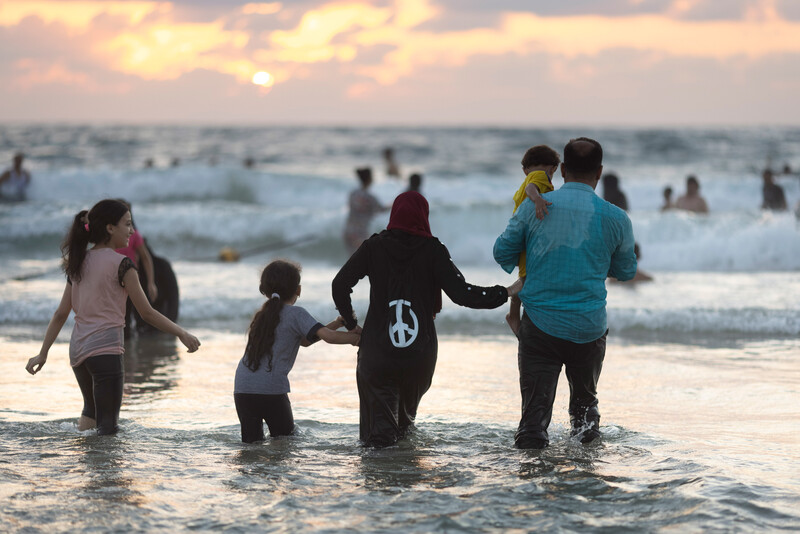
Palestinians, some holding Israeli citizenship and others from the West Bank, spend time at Jaffa beach during the third day of Eid al-Adha, 22 July.
ActiveStills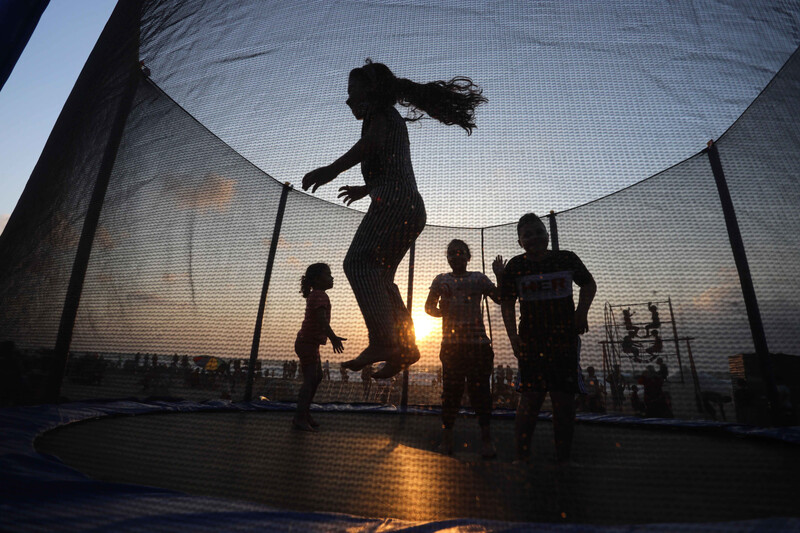
Children play at the beach in Deir al-Balah, central Gaza Strip, during Eid al-Adha, 23 July.
APA images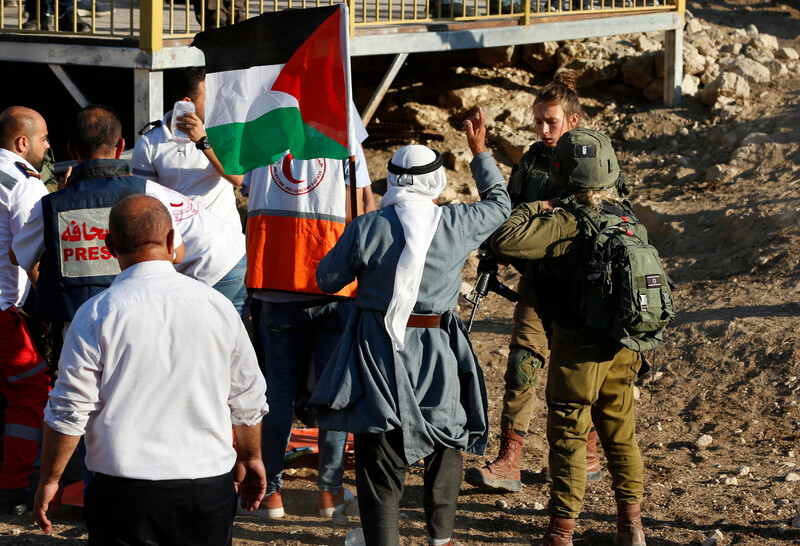
Palestinian demonstrators confront Israeli forces during a protest against settlements near Tubas in the central West Bank, 27 July.
APA images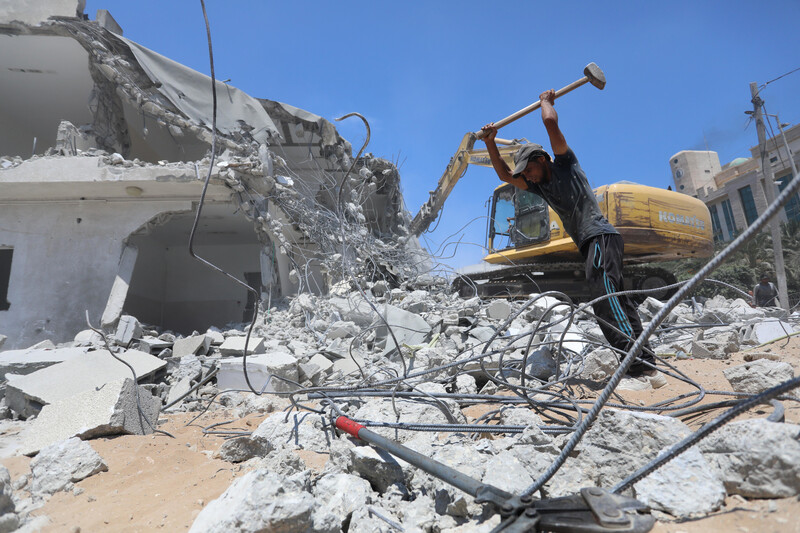
Palestinian workers remove the rubble of buildings recently destroyed in Israeli strikes in Gaza City on 27 July. Human Rights Watch said it investigated three Israeli strikes that killed 62 Palestinian civilians where there were no evident military targets in the vicinity. Other Israeli attacks during the conflict were also likely unlawful, the rights group said.
APA images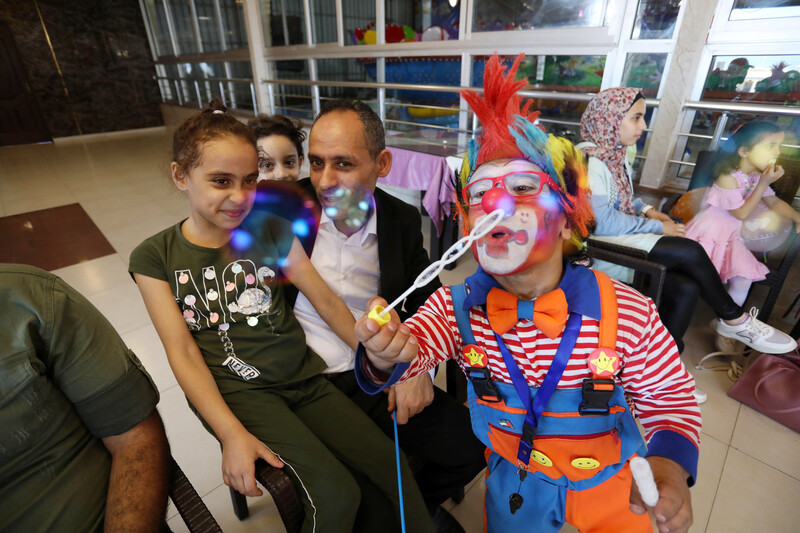
Suzie Ishkontana and her father Riyad attend a Gaza City event organized for children whose relatives were killed in recent Israeli airstrikes, 28 July. Suzie and her father were pulled from the rubble of their home after an Israeli airstrike that killed the girl’s mother and four of her siblings.
APA images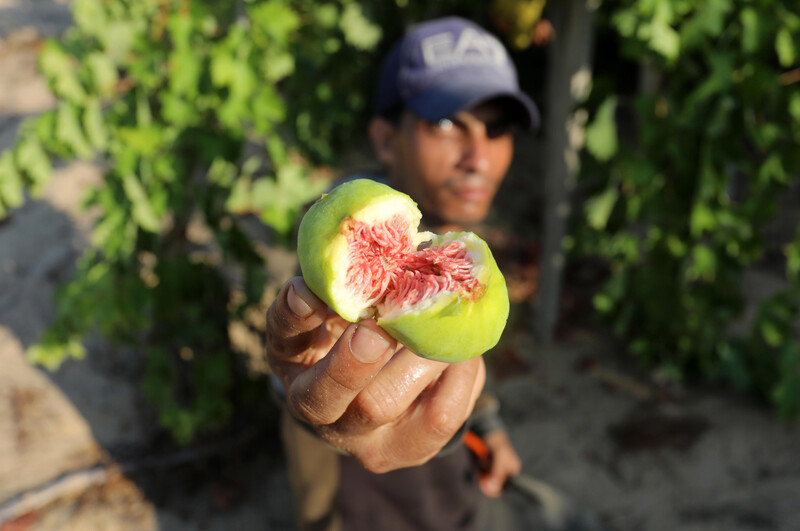
A Palestinian man harvests figs in Gaza City on 28 July. Figs, grapes and watermelons are among the most popular fruits during Gaza’s hot summers.
APA images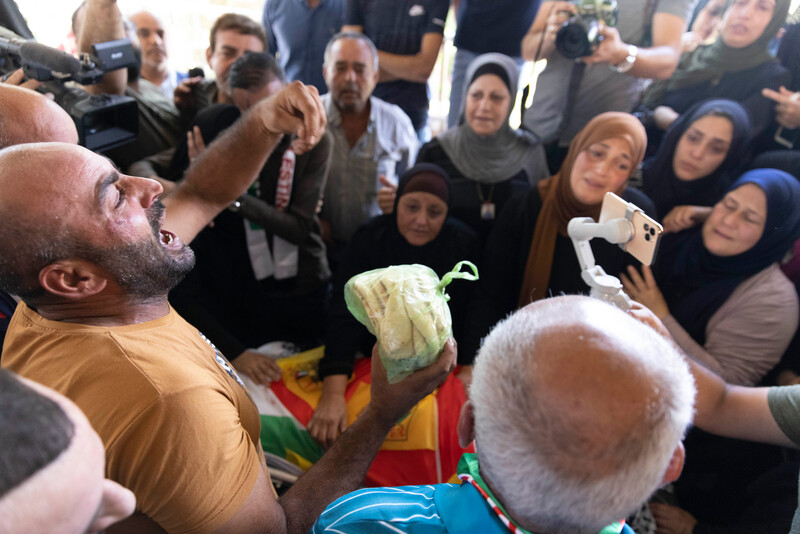
The funeral of 11-year-old Muhammad Abu Sara, in the village of Beit Ummar, north of Hebron, July 29, 2021. The boy was shot by Israeli soldiers while sitting in his family’s car as he and his father returned from buying groceries. The funeral was followed by clashes with Israeli soldiers, resulting in another Palestinian killed from live fire and around a dozen injuries.
ActiveStills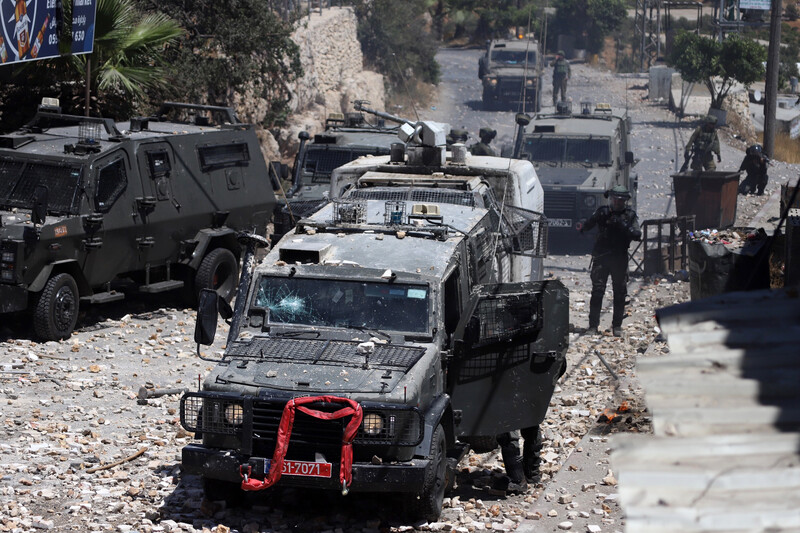
Palestinians confront Israeli forces following the funeral of Muhammad Abu Sara, 11, who was killed by an Israeli soldier, near the West Bank city of Hebron, 29 July.
APA images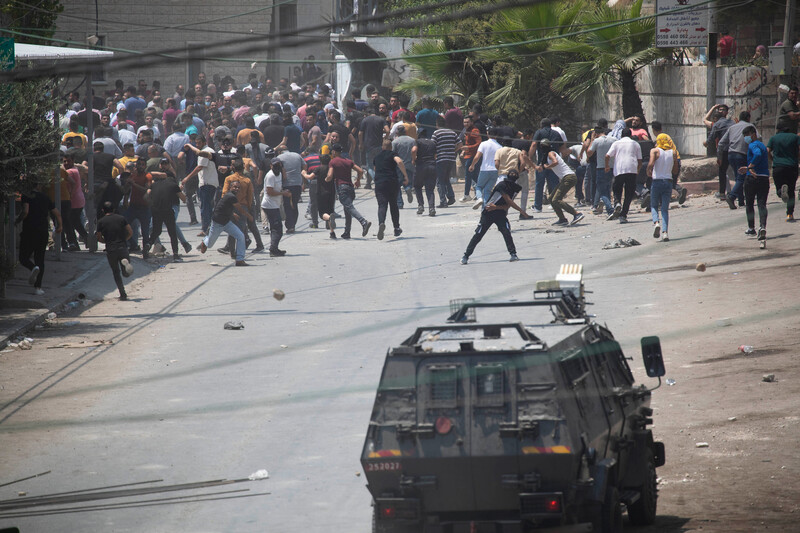
Palestinians confront Israeli occupation forces following the funeral of Shawkat Khalid Awad, 20, in the southern West Bank town of Beit Ummar on 30 July. Awad was killed when Israeli soldiers shot him with live ammunition during confrontations with those attending the funeral of 11-year-old Muhammed Abu Sara. The child was killed when Israeli soldiers shot live ammunition at his family’s car as he rode with his father.
ActiveStills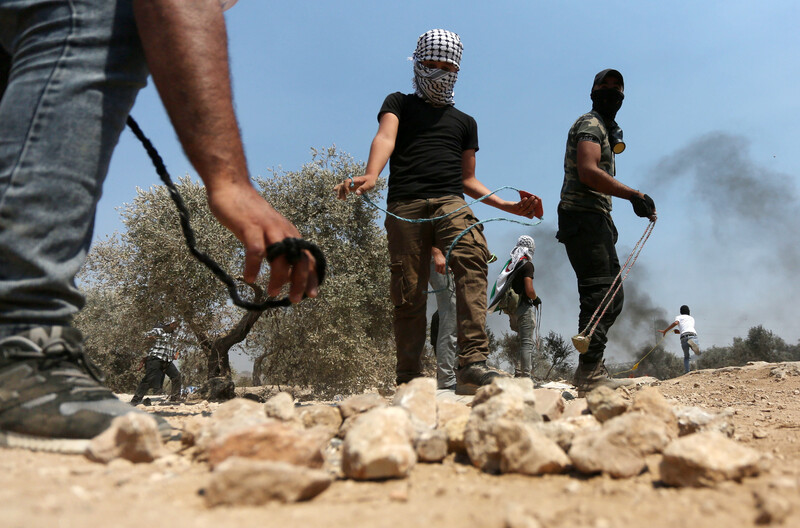
Palestinian protesters confront Israeli forces in the town of Beita, near the West Bank city of Nablus, on 30 July.
APA images

